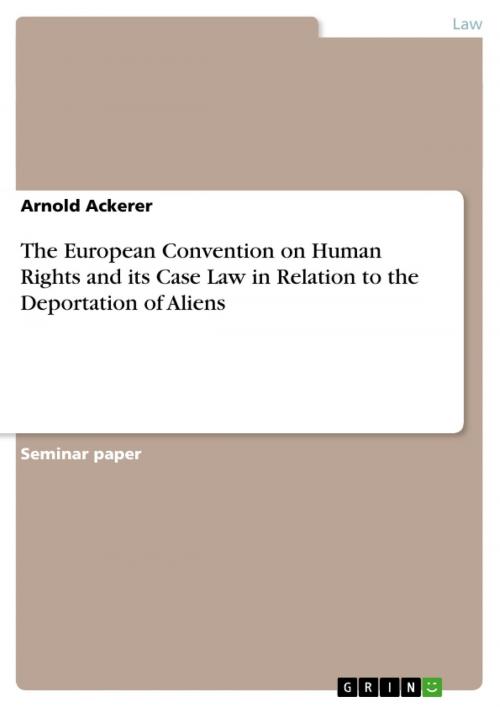The European Convention on Human Rights and its Case Law in Relation to the Deportation of Aliens
Nonfiction, Reference & Language, Law, International| Author: | Arnold Ackerer | ISBN: | 9783638346962 |
| Publisher: | GRIN Publishing | Publication: | February 5, 2005 |
| Imprint: | GRIN Publishing | Language: | English |
| Author: | Arnold Ackerer |
| ISBN: | 9783638346962 |
| Publisher: | GRIN Publishing |
| Publication: | February 5, 2005 |
| Imprint: | GRIN Publishing |
| Language: | English |
Seminar paper from the year 2004 in the subject Law - European and International Law, Intellectual Properties, grade: A, Hiroshima University (International Law), course: Internationales Recht, 8 entries in the bibliography, language: English, abstract: To learn from the atrocities committed during the Second World War and to avoid their reoccurrence was the declared aim of all nations after the WW II was over and the Axis powers had been defeated. Once and for all it had become clear that the protection of human rights could not be regarded as any nation's internal affairs. In Europe, Nazi-Germany served as a deterring case how a national regime could impose progressively worse treatments (from discriminations to genocide) on certain minorities, if no outside control provided an ultimate safeguard. The aim of the international law treaties signed inside Europe after WWII was to provide exactly such a safeguard and to integrate defeating and defeated countries into binding cooperation. One such cooperation took the form of the European Communities (most prominently the EC), another one the form of the Council of Europe (the organization drafting and controlling the European Convention on Human Rights (henceforth: convention)). In this paper using the issue of deportation of aliens I want to provide an overview on the position of a typical European country like Austria in regard to the obligation derived from the convention institution's case law. ? What is 'deportation'? (Merriam-Webster's Dictionary of Law). The removal from a country of an alien whose presence is illegal or detrimental to the public welfare. NOT: Exclusion: refusal of entry into a country by the immigration officials. NOT: Extradition: the surrender of an accused usually under the provisions of a treaty or statute by one sovereign (state or nation) to another that has jurisdiction to try the accused and that has demanded his or her return. Which aliens enjoy welcome varies with different nations, the four problem categories below, however, serve as a general outline for understanding 'unwanted immigration'. i.) illegal aliens discovered on a nation's territory ii.) legal long-term aliens becoming illegal iii.) legal aliens committing misdemeanors iv.) 2nd generation immigrants (or later) committing misdemeanors
Seminar paper from the year 2004 in the subject Law - European and International Law, Intellectual Properties, grade: A, Hiroshima University (International Law), course: Internationales Recht, 8 entries in the bibliography, language: English, abstract: To learn from the atrocities committed during the Second World War and to avoid their reoccurrence was the declared aim of all nations after the WW II was over and the Axis powers had been defeated. Once and for all it had become clear that the protection of human rights could not be regarded as any nation's internal affairs. In Europe, Nazi-Germany served as a deterring case how a national regime could impose progressively worse treatments (from discriminations to genocide) on certain minorities, if no outside control provided an ultimate safeguard. The aim of the international law treaties signed inside Europe after WWII was to provide exactly such a safeguard and to integrate defeating and defeated countries into binding cooperation. One such cooperation took the form of the European Communities (most prominently the EC), another one the form of the Council of Europe (the organization drafting and controlling the European Convention on Human Rights (henceforth: convention)). In this paper using the issue of deportation of aliens I want to provide an overview on the position of a typical European country like Austria in regard to the obligation derived from the convention institution's case law. ? What is 'deportation'? (Merriam-Webster's Dictionary of Law). The removal from a country of an alien whose presence is illegal or detrimental to the public welfare. NOT: Exclusion: refusal of entry into a country by the immigration officials. NOT: Extradition: the surrender of an accused usually under the provisions of a treaty or statute by one sovereign (state or nation) to another that has jurisdiction to try the accused and that has demanded his or her return. Which aliens enjoy welcome varies with different nations, the four problem categories below, however, serve as a general outline for understanding 'unwanted immigration'. i.) illegal aliens discovered on a nation's territory ii.) legal long-term aliens becoming illegal iii.) legal aliens committing misdemeanors iv.) 2nd generation immigrants (or later) committing misdemeanors















